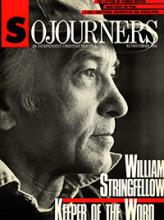Frank William Stringfellow, who never used his first name, was born in Cranston, Rhode Island, and grew up in Northampton, Massachusetts. His parents, Frank and Margaret, had ended their studies with grammar school. His father worked as a knitter in the hosiery industry, and, during the Great Depression and after, he was often out of work. Yet, Bill wrote later, "As a child I was not really aware we were poor."
His older sister, Winifred Brown, describes him as having been "a cute little kid." His school performance was average, and he had problems with spelling. He was an active member of the debating club in high school, and his sister remembers that, while he had little interest in school athletics, he became the only male cheerleader and zealously attended games. "At the time in life when (I suppose) I should have been obsessed with football, sex, or pop music, as my peers seemed to be," Bill wrote, "I was very bothered about the identity of Jesus ..."
Such seriousness about matters of faith went unrecognized by his family. They were regular participants in the life of the local Episcopal congregation, and they knew that Bill was appropriately involved in youth activities. Bill remembered it differently. Not only did he attend programs, but "the parish premises and the rectory were places where I spent other hours—playing, doing errands and odd jobs, loitering, watching."
His parish had a succession of strong rectors, and one, whom Bill did not identify, apparently pressured him during their "sometimes esoteric religious discussions" to consider the priesthood as his vocation. In one way it made sense. It would solve the problem of how he could finance college and graduate studies. "But I was also beginning to comprehend that the Gospel was, somehow, not about religion, but reached beyond religion," he wrote. He felt pressured and acknowledged that it led to a hostility toward clergy that was long in ebbing.
Read the Full Article

